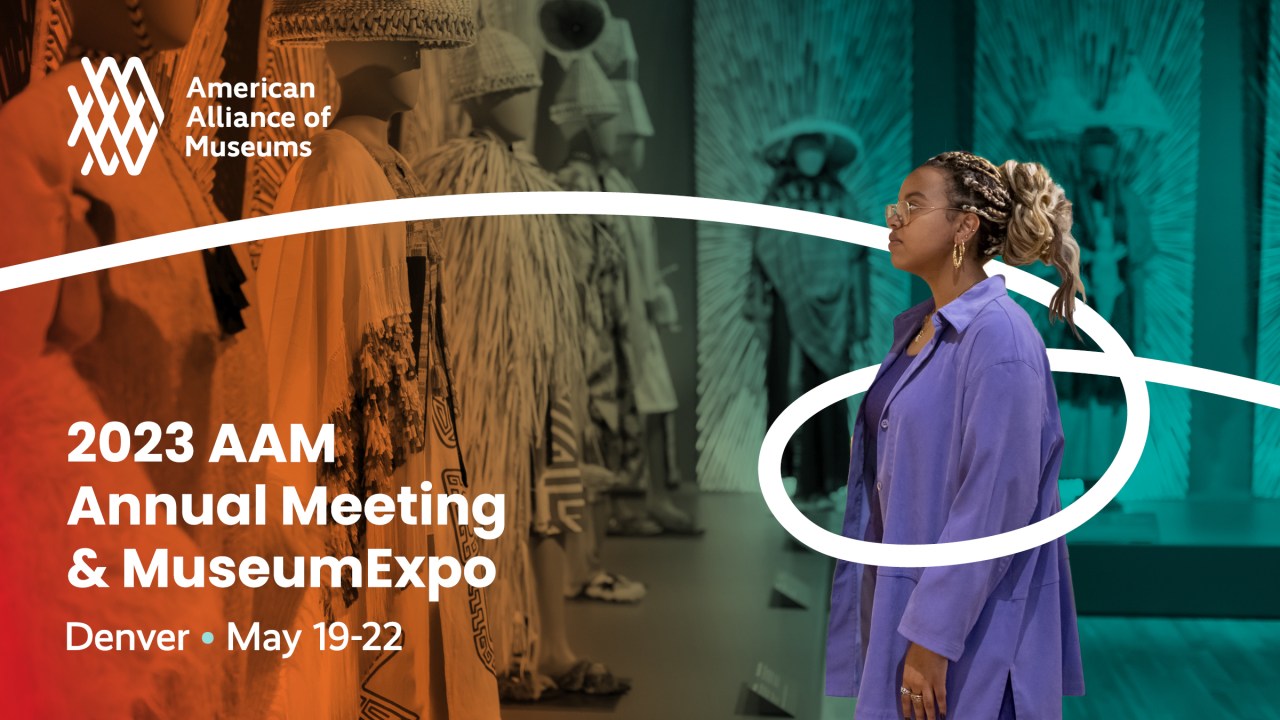
For as long as anyone could remember, AAM’s 115-year-old Annual Meeting & MuseumExpo had been structured in about the same way. As with most professional conferences, people who wanted to present at the meeting submitted session proposals to “tracks” corresponding to functional areas of museum work—like collections or marketing—which committees of professionals in those areas reviewed for acceptance. But a few years ago, Tiffany Gilbert, AAM’s Assistant Director of Meetings & Events, began to think it was time for a new approach.
Reading the feedback her team receives from attendees every year, she noticed increasingly more people saying the program was missing conversations they considered crucial to the progress of the field. Most often, these conversations concerned social issues, things that transcended traditional museum operations and did not correspond to any one discipline of museum work. But few people were proposing sessions like these, and she believed it was because the structure wasn’t encouraging them to.
For that reason, starting with the 2022 meeting earlier this year, she decided to overhaul that structure. Instead of the job-related tracks, she worked with staff to identify four thematic areas to organize the program around, each representing an issue that had come to the fore in field discourse in the previous year. This way, people submitting proposals would have to think about how their topics fit into a broader concern affecting museums at that moment, such as the place of museums in society or the need for healthy work cultures. And the reviewers, now organized by expertise in those themes instead of by discipline, would have a clearer picture of what made a session appropriate for that year’s meeting.
Amid heightened calls to reimagine museum practice, this new thematic focus was designed to deliver a different sort of conference, one that meets the moment and delivers the conversations and information museum professionals need most. Now, based on feedback from a successful trial year in Boston, many of those changes are coming back in Denver for #AAM2023, with refinements that aim to make it one of the most stimulating and transformative Annual Meetings ever. Here are a few things you can expect during your #AAM2023 experience.
New Focus: Social & Community Impact
In the process of designing AAM’s 2022-2025 Strategic Framework, which relied heavily on thousands of survey responses from the museum professional community, staff and leadership discovered one clear priority emerging in the field: social and community impact. Living through a time when the needs and vulnerabilities of their local communities had become hyper-visible, museum people were wondering how they could better create and demonstrate a positive effect on the world around them. This concept became one of four priorities written into the Strategic Framework, and AAM committed to an initiative dedicated to advancing it, led by Megan Lantz as the Director of Social Impact.
Since then, Megan has spent much of 2022 deep in study of the topic, reading literature, attending conferences, and connecting with some of the leading researchers and practitioners in the field. When the time came to identify an overarching theme for next year’s Annual Meeting, she was tapped to design a narrative and structure that responded to what she had been hearing from the field and what she had learned so far.
This was no small feat. As she compiled a list of all the potential dimensions of social and community impact the meeting this research had unearthed, it soon reached almost one hundred items. Eventually, she combined these into four broader “clusters” that became the subthemes of #AAM2023:
- People, which concerns the impact museums have on humanity, including members of the public and those who work in them. In these sessions, you’ll hear about topics like labor practices, inclusive representation in programming, mental health, and human rights.
- Power, which concerns how museums wield their influence and resources to address social issues. In these sessions, you’ll be joining conversations on activism, civic engagement, trust and accountability, and ceding authority to communities in these sessions.
- Planet, which concerns the impact museums have on the climate crisis—and the impact the climate crisis has on them. In these sessions, you’ll be diving into sustainable practices, carbon neutrality, natural disasters, and environmental justice.
- Possibility, which concerns how museums can gain funding based on their social impact and adopt financial practices that generate social impact. In these sessions, you’ll be jumping into conversations on reparative finance and restorative economics, public-private partnerships, ethical investing, and trends in philanthropy.
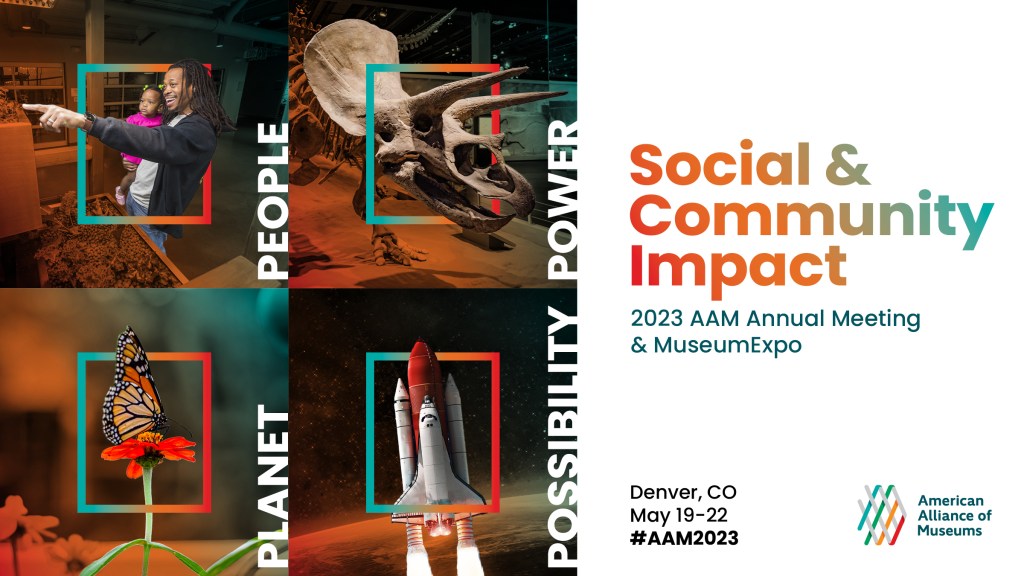
Based on feedback from this year’s experiment with thematic tracks, in 2023 programming in these areas will be interwoven throughout the conference instead of in separate time blocks. That way, fewer sessions in each track will have overlapping time slots, making it easier for you to catch all the must-see items on your agenda.
The program is designed to help museums further orient themselves to their communities, allowing their needs and solutions to come to the surface and deepening their relationships within their communities. By investigating what ripple effects these outcomes can have on society, and rethinking how to leverage their assets—collections, spaces, and people—for the good of their local communities, museums can seize on opportunities to secure the long-term sustainability and relevance of their organizations.
New Flow: Connect, Explore, Practice
Given the nature of social and community impact, which requires thoughtful reflection and hands-on action in equal measure, this Annual Meeting also felt like a good opportunity to experiment with a new, more sequential flow to the program.
Two common pieces of feedback our team hears are that people would like more chances during the meeting to talk to one another and to think through how to implement new ideas in their work. Over the years, the Meetings & Events team has experimented with different ways to build these opportunities into the program, though usually by sprinkling them in between blocks of informational sessions.
This year, a new idea occurred to Tiffany. What if we put unstructured conversations, informational sessions, and practical workshops on equal footing, organizing them in a sequence that will maximize their impact? And so, at #AAM2023, you can expect your experience to be shaped around creating connections, exploring new ideas, and getting hands-on with practical workshops.
In the first two days of the Annual Meeting, you will find ample opportunities to make new connections, reconnect with old friends, and discuss what challenges you’re facing at work. These opportunities will include unstructured social gatherings, planned meet-ups based on discipline or affinity, and facilitated roundtable conversations proposed by members of the community. No matter how many people you know attending, or how introverted or extroverted you are, the aim is to help you meet your peers and build the connections you need to thrive.
Simultaneously, you will head into educational sessions that share models and frameworks for addressing some of these issues you are discussing. The mixture of these structured presentations and open-ended conversations is designed to avoid information overload and help you process what you’re learning in real time.
Finally, the last day of the program will drill down on the insights of the previous two days with workshops offering concrete tools to put social impact into action. These hands-on sessions will teach you the how-tos of social impact: identifying community needs, developing practices to address those needs, measuring the impact of those practices, and championing that impact to decisionmakers.
This way, you’ll go home with a notebook full of ideas and plans, feeling confident and ready to make a positive impact on your community.
New Formats: An End to FOMO
The last piece of feedback the team is working to address this year involves the format of sessions. Over the years, some meeting-goers have shared that, listening to inspirational conversations and case studies on the program, they feel more overwhelmed than empowered. Sometimes they feel like they’re being told how to think, but not what to do. Or they feel like they’re hearing about all the great things other museums are doing, but don’t have a real sense of how it could apply to their museums. Instead of feeling motivated and inspired, they feel FOMO: like there’s more they should be achieving in their work but no way to achieve it.
To counteract this, this year Tiffany designed the call for proposals process to encourage presenters to step out of these familiar formats. Rather than didactic panels, where a small group of people present their work as case studies, she hopes this meeting will include more synthesis, dialogue, and guidance throughout. To encourage this, she gave those proposing sessions four general format options: roundtable, session, workshop, or poster talk. In addition, she added fields to the proposal form asking how presenters intend to interact with the audience, and what they anticipate attendees gaining from the session, which an incredible cadre of reviewers, our Content Advisory Committee, will use to assess their fit to this year’s changes.
Social and community impact is a big, broad idea—one which risks getting stuck at the aspirational stage if you don’t break it down. All the changes coming to Denver are designed to avoid this fate. By increasing interactivity and emphasizing how to achieve the aspirations circulating in the field, we hope to make this a truly transformative convening, one that gives you the tools you need to make true change in your community and in the world.
These plans are just the start of what’s in store for next May. Sign up now for ongoing updates about the developing program, including speakers and sessions, networking opportunities, parties, and experiential workshops (read: field trips!).


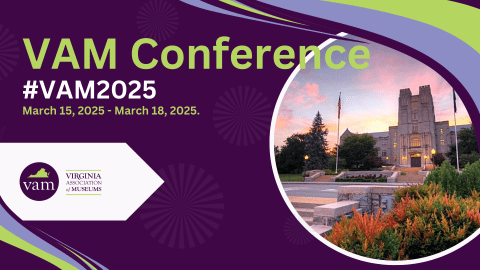

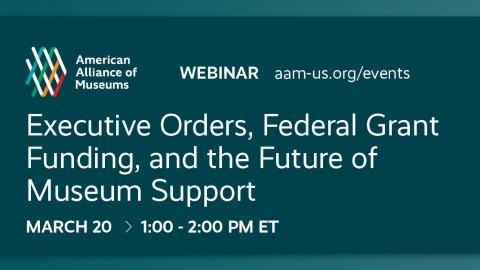
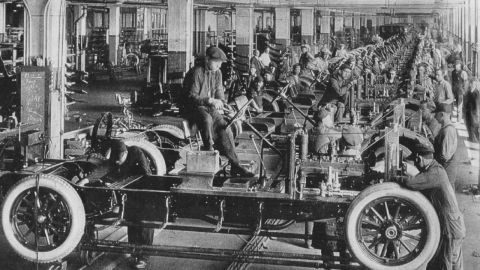
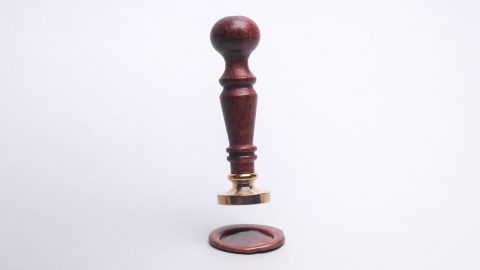

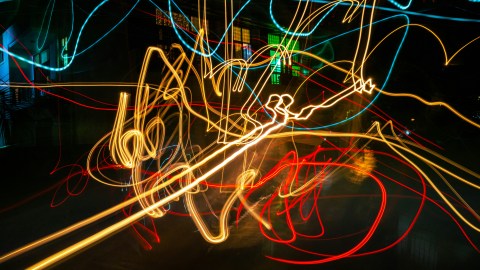
Will there be a way to attend via zoom?
Hi Connie! Unfortunately there will not be a virtual option for this meeting due to the costs of producing a hybrid conference (see our FAQ here for more information: https://annualmeeting.aam-us.org/faq/). But we are planning for an all-virtual event this fall, as well as other year-round accessible programming as part of our new investment into professional development programs: https://www.aam-us.org/topic/aam-announces-1-million-investment-in-the-museum-community/